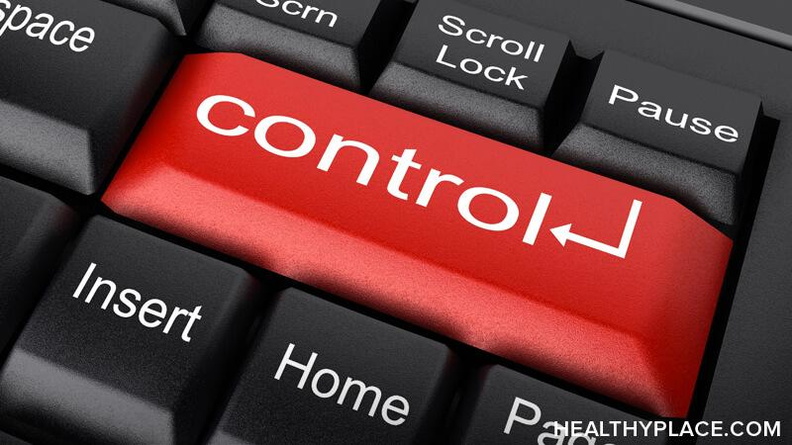Controlling Beliefs and Behaviors Harm Mental Health Recovery

Have you ever noticed that control is a major life issue for people? And have you noticed that we all, as human beings, want to have control of ourselves, others, and pretty much the entire universe, if we had our way? Of course, you've noticed, because you've lived around other people enough to know that our quest to control permeates much of our lives.
Controlling Beliefs and Behaviors Are Key Factors in Abuse
People will try to control you, to bend your will into whatever they want it to be. We've all heard about the proverbial control freak, the person who is so in to making everything happen their way they drive other people away because of their rigidity and inflexibility.
This can happen in big ways and small. It can happen with our loved ones or from complete strangers. Our partner tries to tell us how to dress. A stranger in the parking lot of Wal-Mart gestures for us to park in a certain spot, usually so they can get the better spot. When we resist these subtle attempts to make our decisions for us, these people become angry with us for not following their master plan (How Abusers Gain Control By Appearing to Lose It).
The root of the pathological need to control others is fear. In relationships, this need to control can get seriously ugly when one partner tries to control the other, which can be a form of abuse and domestic violence.
The abuser/controller in relationships wants to control the other because they're afraid if they don't control everything, their partner will destroy them by having an affair or by abandoning them. When they control everything in a relationship, they have the power. And they will do almost anything to hold onto that power because they know having the power means they can maintain control of their partner and the relationship.
How Controlling Beliefs and Behaviors Affect Mental Health Recovery
 So how does controlling behavior and thinking affect us in our mental health recovery? When we try to control everything, we have no peace because the things we can’t control are always pressing in on us, making us feel angry, depressed, and anxious. Just as the abuse in a relationship ruins mental health, self-abuse, the need for absolute control, does the same thing. For those with mental illness, this can be especially dangerous. Most mental disorders already involve these same emotions, among others.
So how does controlling behavior and thinking affect us in our mental health recovery? When we try to control everything, we have no peace because the things we can’t control are always pressing in on us, making us feel angry, depressed, and anxious. Just as the abuse in a relationship ruins mental health, self-abuse, the need for absolute control, does the same thing. For those with mental illness, this can be especially dangerous. Most mental disorders already involve these same emotions, among others.
Controlling Beliefs and Behaviors of Others Prohibit Mental Health Recovery
One of the goals of recovery is self-advocacy, the idea that we become increasingly able to reach out for what we need consistently without the help of others. It includes assertiveness and the realization that it's okay to say no.
This brings us to the point of no return with controlling behavior and controlling people. As people in mental health recovery, we cannot afford the temptation to allow others to control us. We must be focused on controlling our own selves and our own behavior. Only then will we experience the freedom that independence and prolonged mental health recovery can bring.
APA Reference
Ehrmantrout, M.
(2014, July 9). Controlling Beliefs and Behaviors Harm Mental Health Recovery, HealthyPlace. Retrieved
on 2025, November 7 from https://www.healthyplace.com/blogs/recoveringfrommentalillness/2014/07/mental-health-recovery-requires-saying-goodbye-to-controlling-beliefs-and-behaviors
Author: Mike Ehrmantrout
Thanks for your comment. I don't really have a "formula," so to speak. But one thing I do is when I decide the subject of the piece, I spend like 3 or 4 days just musing and really trying to think through the subject. This way, when i do sit down to write, the thoughts and ideas I've been thinking about just begin to come out. Good luck and keep writing!
This something I have to work on daily. The worst for me is trying to control my thoughts and feelings. I can look at situations from a logical perspective and then I try to force my thoughts to be a certain way. I get so frustrated that my brain doesn't do what I want it to do. In therapy I'm working a lot on just letting go and accepting my thoughts. It's amazing what a difference just saying "let go" to myself makes. Acceptance is key. "Yield and overcome"
I totally get what you're saying about the difficulty controlling the brain and thoughts that trouble us. I too am working on not judging my thoughts either way, to just allow my thoughts to be what they are, either good or bad. Of course we know, we do have to challenge rotten thinking, but we don't have to judge ourselves for it.